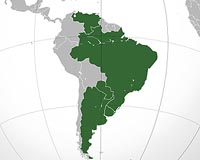 |
Baghdad (UPI) Dec 18, 2009 Iran's reported seizure of a border oil well just inside Iraqi territory came hot on the heels of Baghdad's success in signing up foreign oil companies to boost its limping oil production, a plan that deeply alarms OPEC members, especially neighboring Iran. Iraqi Oil Minister Hussain al-Shahristani says he wants to ramp up his country's production from the current 2.4 million barrels per day to 10 million to 12 million bpd -- more than 10 percent of the current global oil output -- in six years. That will mean that the 12 member states of the Organization of Petroleum Exporting Countries will have to cut their production levels to accommodate Iraq's planned increases. According to Iraqi officials, a dozen Iranian troops took over Well No. 4 in the Faqua field along the disputed southern border between the two traditional foes Thursday night. Faqua is one of a cluster of oil-producing zones known as the large East Maysan fields, which contain an estimated 2.46 billion barrels of oil. The Iranians reportedly raised the Iranian flag over the well, which lies some 500 yards west of the informally demarcated frontier in the Dehloran region. The well had been abandoned because of the border dispute. Ali Hussein Balou, chairman of the Iraqi Parliament's Oil and Gas Committee, was quoted as saying there were clashes near the oil well in April and July. It was not clear why the Iranians carried out the border operation when they did, but it may have been a warning shot to Baghdad not to try to muscle its way back to being a leading oil producer at the expense of Iran and others. The timing of the Iranian incursion, however small, may be significant. It came only days after the Iraqi Oil Ministry held a two-day auction for 20-year service contracts among international oil companies. These companies will now take over 10 of Iraq's main oil fields and boost production as soon as possible. Baghdad needs the revenue to bankroll its reconstruction plans and restore Iraq's fortunes after decades of war, sanction and upheaval. But the OPEC states are not happy about that because Shahristani's ambitious project threatens to cut into their oil earnings. "As prospects increase for Iraq to approach prewar (oil production) levels the issue of reincorporating Iraq into OPEC's system of production targets will quickly re-emerge as a topic for negotiations," according to oil industry consultants PFC Energy. "The process of reaching a negotiated settlement could add further friction to what will already be a difficult process of managing oil markets during the global economy's weak recovery." At the heart of this matter is the fact that Iraq, a founding member of OPEC, has been exempt from the cartel's production quota system since the United Nations imposed economic sanctions on Baghdad following Saddam Hussein's August 1990 invasion of Kuwait. The other OPEC producers picked up the slack and boosted their own output, and are now reluctant to relinquish that extra production. Now that oil prices have fallen back from the peak levels of 2007-08 they are even less inclined to cut back their own production to incorporate Iraq back into the system. If Iraq's succeeds in overcoming its many problems, political and technical, and achieves a significant production increase in the next couple of years, prices will tumble significantly yet again, undermining the economies of the producing states. Iran's economy is already in deep trouble and, as it faces the threat of a major confrontation with the West over its controversial nuclear program, it is no mood for challenges from its historical adversary Iraq. "Within the cartel, many countries, such as Algeria and Libya, argue that their production capacity has increased since the division of quotas was last decided and that they are, therefore, entitled to a bigger, not smaller, slice of the pie," The Financial Times reported Friday. "But countries such as Iran and Venezuela, whose production has shrunk since the quota allocations were decided, are loath to admit it and will likely prove unwilling to accommodate Iraq's new production by reducing their own quotas." Iran is extremely jumpy these days because of its confrontation with the West and Israel over its nuclear program, and is bracing for possible pre-emptive military strikes by Israel. Tehran is also facing the imposition of harsh economic sanctions by the U.N. Security Council following its refusal to abandon its uranium enrichment efforts, which the Americans and Israelis say are intended to produce weapons-grade material. Share This Article With Planet Earth
Related Links Powering The World in the 21st Century at Energy-Daily.com
 Paraguay opposes Venezuela in Mercosur
Paraguay opposes Venezuela in MercosurAsuncion, Paraguay (UPI) Dec 18, 2009 Venezuela's incorporation in Mercosur, considered a certainty after Brazilian ratification, now faces a new hurdle in Paraguay, which says the man and not the country is the problem. Paraguay reiterated this week it would oppose Venezuela's entry so long as Hugo Chavez continued interfering in Paraguay's internal affairs. The Paraguayan comment rules out an early end to the arguments ... read more |
|
| The content herein, unless otherwise known to be public domain, are Copyright 1995-2009 - SpaceDaily. AFP and UPI Wire Stories are copyright Agence France-Presse and United Press International. ESA Portal Reports are copyright European Space Agency. All NASA sourced material is public domain. Additional copyrights may apply in whole or part to other bona fide parties. Advertising does not imply endorsement,agreement or approval of any opinions, statements or information provided by SpaceDaily on any Web page published or hosted by SpaceDaily. Privacy Statement |